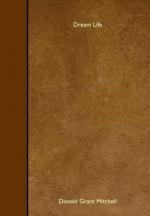But, alas! it is only when this sisterly love is lost forever,—only when the inexorable world separates a family, and tosses it upon the waves of fate to wide-lying distances, perhaps to graves,—that a man feels, what a boy can never know,—the disinterested and abiding affection of a sister.
All this that I have set down comes back to you long afterward, when you recall with tears of regret your reproachful words, or some swift outbreak of passion.
Little Madge is a friend of Nelly’s,—a mischievous, blue-eyed hoiden. They tease you about Madge. You do not of course care one straw for her, but yet it is rather pleasant to be teased thus. Nelly never does this; oh no, not she. I do not know but in the age of childhood the sister is jealous of the affections of a brother, and would keep his heart wholly at home, until, suddenly and strangely, she finds her own wandering.
But after all Madge is pretty, and there is something taking in her name. Old people, and very precise people, call her Margaret Boyne. But you do not: it is only plain Madge; it sounds like her, very rapid and mischievous. It would be the most absurd thing in the world for you to like her, for she teases you in innumerable ways: she laughs at your big shoes, (such a sweet little foot as she has!) and she pins strips of paper on your coat-collar; and time and again she has worn off your hat in triumph, very well knowing that you—such a quiet body, and so much afraid of her—will never venture upon any liberties with her gypsy bonnet.
You sometimes wish in your vexation, as you see her running, that she would fall and hurt herself badly; but the next moment it seems a very wicked wish, and you renounce it. Once she did come very near it. You were all playing together by the big swing; (how plainly it swings in your memory now!) Madge had the seat, and you were famous for running under with a long push, which Madge liked better than anything else;—well, you have half run over the ground when, crash! comes the swing, and poor Madge with it! You fairly scream as you catch her up. But she is not hurt,—only a cry of fright, and a little sprain of that fairy ankle; and as she brushes away the tears and those flaxen curls, and breaks into a merry laugh,—half at your woe-worn face, and half in vexation at herself,—and leans her hand (such a hand!) upon your shoulder, to limp away into the shade, you dream your first dream of love.
But it is only a dream, not at all acknowledged by you; she is three or four years your junior,—too young altogether. It is very absurd to talk about it. There is nothing to be said of Madge, only—Madge! The name does it.
It is rather a pretty name to write. You are fond of making capital M’s; and sometimes you follow it with a capital A. Then you practise a little upon a D, and perhaps back it up with a G. Of course it is the merest accident that these letters come together. It seems funny to you—very. And as a proof that they are made at random, you make a T or an R before them, and some other quite irrelevant letters after it.




